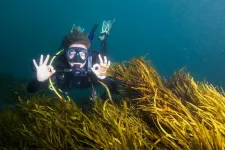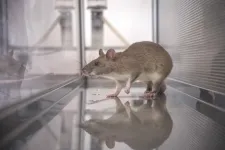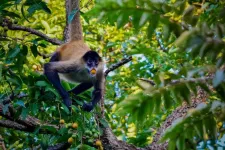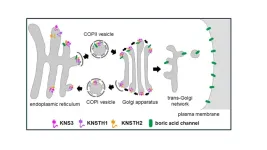(Press-News.org) In the face of increased human pressures and climate change, a team of Australian scientists led by Dr Georgina Wood at Flinders University have launched a new online tool to assist marine managers and restoration experts to bolster the resilience of marine habitat-forming species.
The ‘Reef Adapt’ initiative, developed by experts from the NSW Department of Primary Industries and Regional Development (NSW DPIRD), Flinders University and The University of Western Australia (UWA), aims to expand the tools available to promote diverse, adaptable and resilient ecosystems.
Described in a new article in Communications Biology, Reef Adapt harnesses genetic data from diverse marine species – including key reef-building corals and habitat-forming kelps, but with scope to expand to other taxa – to map out areas likely to harbour populations adapted to current and future environmental conditions.
The innovative web platform is designed for the rapid inclusion of genetic, biophysical and environmental data into planning of marine restoration and assisted conservation initiatives.
The tool provides users with maps that identify areas with populations suited to their specific restoration sites under current and future climate scenarios. The platform will initially house data for 27 species collected from 420 sample locations across the globe. Users will also be able to upload their own data to the site, further supporting the conservation of other species and areas.
While guidelines for terrestrial ecosystem restoration seed-sourcing exists, for example, the US National Seed Strategy and Australia’s Florabank, Reef Adapt is one of the first tool of its kind for marine environments.
The project follows similar projects on land, such as Australia’s NSW Restore and Renew program, to remove barriers of access to genetic data and improve restoration and assisted gene flow
Dr Georgina Wood, an Australian Research Council Early Career Industry Fellow with Flinders University and Adjunct Research Fellow at UWA, says global efforts to restore ecosystems are intensifying, including the Convention on Biological Diversity’s recent adoption of the Kunming-Montreal Global Biodiversity Framework which aims to put 30% of degraded ecosystems under effective restoration by 2030.
“Alongside the increase in scale of marine restoration projects, there is a need ensure that restoration practices keep up with the latest available science, including the use of cutting-edge genomic information to make informed decisions about where to source restoration stock material,” says researcher Dr Wood
“Our world is changing now more rapidly than ever before. Ideally, every restoration project would incorporate climate adaptation into their design, but the data needed for this are typically difficult to access. Reef Adapt puts this information directly into the hands of both managers and practitioners,” she says.
The easy-to-use web platform hosts vital genetic information for government, not-for-profit and community organisations – removing barriers of access to vital information that the team hopes will improve both immediate and long-term restoration outcomes.
Dr Melinda Coleman, NSW DPIRD Senior Principal Research Scientist, says the Reef Adapt online webtool will help guide marine restoration and assisted adaptation programs now and into the future.
“The revolutionary new Reef Adapt tool will use cutting-edge genomic data and seascape analyses to help marine managers, restoration practitioners and other stakeholders including aquaculture make informed decisions about where to source stock for restoration or aquaculture as well as help select climate proof stock that will withstand future ocean conditions,” explains says Dr Coleman.
“We hope that this webtool will be used broadly across marine and conservation managers, community groups or anyone embarking on marine restoration as well as aquaculture proponents.”
Dr Wood says the new Nature article and user manual give examples, with several case studies of ecologically and evolutionarily diverse taxa, including the staghorn coral (Acropora kentii), cauliflower coral (Pocillopora damicornis), golden kelp (Ecklonia radiata) and crayweed (Phyllospora comosa).
Development of the tool required collection of almost 10,000 reference data points from published population genetic literature, as well as a suite of environmental data and oceanographic models.
The article, ‘Reef Adapt: A tool to inform climate-smart marine restoration and management decisions’ (2024) by GV Wood (Flinders), KJ Griffin (UWA), M van der Mheen (UWA), MF Breed (Flinders), JM Edgeloe (UWA), C Grimaldi (UWA / Australian Institute of Marine Science, Perth), A Minne (UWA), I Popovic (University of Queensland), K Filbee-Dexter (UWA / Institute of Marine Research, Norway), MJH van Oppen (Australian Institute of Marine Science, Townsville / University of Melbourne), T Wernberg (UWA / Institute of Marine Research, Norway) and MA Coleman (UWA / NSW DPI, Fisheries) has been published in Communications Biology DOI: 10.1038/s42003-024-06970-4.
Videos and photos: Please credit video courtesy Stefan Andrews from Great Southern Reef Foundation. Photo captions included.
Dr Georgina (‘George’) Wood will present on the use of digital tools to progress marine restoration at the 10th Western Society of Naturalists’ annual meeting in Oregon, US in November.
END
New genetic web tool to help restore climate-resilient marine ecosystems
2024-10-30
ELSE PRESS RELEASES FROM THIS DATE:
Three pathways to achieve global climate and sustainable development goals
2024-10-30
"Sustainable development pathways are strategies that prevent dangerous climate change while at the same time moving towards a world that allows people to prosper on a healthy planet,” explains Bjoern Soergel, scientist at the Potsdam Institute for Climate Impact Research PIK and lead author of the study published in Environmental Research Letters. This is the essence of the 17 SDGs agreed by the United Nations in 2015. “Our analysis shows that all three sustainable development pathways are far more effective than our current ‘business as usual’. They drive substantial progress towards the SDGs, for example reducing the number of people in extreme poverty ...
Giant rats could soon fight illegal wildlife trade by sniffing out elephant tusk and rhino horn
2024-10-30
In the past, African giant pouched rats have learned to detect explosives and the tuberculosis-causing pathogen. Now, a team of researchers have trained these rats to pick up the scent of pangolin scales, elephant ivory, rhino horn, and African blackwood. These animals and plants are listed as threatened and at high danger of extinction.
“Our study shows that we can train African giant pouched rats to detect illegally trafficked wildlife, even when it has been concealed among other substances,” ...
Spin current observations from organic semiconductor side
2024-10-30
Electrons spin even without an electric charge and this motion in condensed matter constitutes spin current, which is attracting a great deal of attention for next-generation technology such as memory devices. An Osaka Metropolitan University-led research group has been able to gain further insight into this important topic in the field of spintronics.
To investigate the characteristics of spin currents, OMU Graduate School of Science Professor Katsuichi Kanemoto’s group designed a multilayer device consisting of a ferromagnetic layer and an organic semiconductor ...
Alcohol consumption among non-human animals may not be as rare as previously thought, say ecologists
2024-10-30
Anecdotes abound of wildlife behaving “drunk” after eating fermented fruits, but despite this, nonhuman consumption of ethanol has been assumed to be rare and accidental. Ecologists challenge this assumption in a review publishing October 30 in the Cell Press journal Trends in Ecology & Evolution. They argue that since ethanol is naturally present in nearly every ecosystem, it is likely consumed on a regular basis by most fruit- and nectar-eating animals.
“We're moving away from this anthropocentric view that ethanol is just something ...
Survey: Dangerous gap in knowledge about pancreatic cancer among adults under age 50
2024-10-30
While pancreatic cancer rates are rising in people under age 50, a new survey conducted by The Ohio State University Comprehensive Cancer Center – Arthur G. James Cancer Hospital and Richard J. Solove Research Institute (OSUCCC – James) shows most people continue to believe that pancreatic disease affects only the elderly – and that there is nothing they can do to reduce their risk.
For this survey, respondents were asked about risk factors for pancreatic cancer. More than half (53%) of adults under age 50 said they would not recognize the early signs or symptoms of the disease, and more than one third (37%) believe there is ...
Women entering menopause later in life at greater risk for asthma
2024-10-30
CLEVELAND, Ohio (Oct. 30, 2024)—Many studies suggest that an earlier age at menopause is more detrimental to a woman’s health, leading to an increased risk for adverse health conditions such as heart disease, diabetes, osteoporosis, and depression, among others. However, a new study is linking a later age at natural menopause with a greater risk for asthma. Results of the study are published online today in Menopause, the journal of The Menopause Society.
Asthma is a common, chronic disease affecting more than 300 million people worldwide. The prevalence of asthma ...
Sinuses prevented prehistoric croc relatives from deep diving
2024-10-30
EMBARGOED: NOT FOR RELEASE UNTIL 00.05 (UK TIME) WEDNESDAY 30 OCTOBER 2024
An international team of paleobiologists have found that the sinuses of ocean dwelling relatives of modern-day crocodiles prevented them from evolving into deep divers like whales and dolphins.
A new paper published today [30 October] in Royal Society Open Science suggests that thalattosuchians, which lived at the time of the dinosaurs, were stopped from exploring the deep due to their large snout sinuses.
Whales and dolphins (cetaceans) ...
Spirited away: Key protein aids transport within plant cells
2024-10-30
Botanists have come to understand the channels and transporters involved in the uptake and transport of nutrients, yet how are they positioned where they need to be?
For example, plants need boron, which is taken into the cells by molecules known as the boric acid channel. But how do the proteins that form the channel make it to the plasma membrane?
A research group led by Professor Junpei Takano of Osaka Metropolitan University’s Graduate School of Agriculture identified a mutant line of Arabidopsis thaliana in which the boric acid channels are not properly transported to the plasma membrane. The cause was a deficiency in the protein KAONASHI3 (KNS3); the name ...
Britain’s brass bands older than we thought and invented by soldiers from the Napoleonic Wars, new study reveals
2024-10-30
University of Cambridge media release
Britain’s brass bands older than we thought and invented by soldiers from the Napoleonic Wars, new study reveals
UNDER STRICT EMBARGO UNTIL 00:01 AM (UK TIME) ON WEDNESDAY 30TH OCTOBER 2024
Military musicians returning from the Napoleonic wars established Britain’s first brass bands earlier than previously thought, new research reveals. The study undermines the idea that brass bands were a civilian and exclusively northern creation.
It is widely believed that brass bands originated with coal miners and other industrial communities ...
The Lancet: Health threats of climate change reach record-breaking levels, as experts call for trillions of dollars spent on fossil fuels to be redirected towards protecting people’s health, lives and
2024-10-30
The Lancet: Health threats of climate change reach record-breaking levels, as experts call for trillions of dollars spent on fossil fuels to be redirected towards protecting people’s health, lives and livelihoods
New global findings in the 8th annual indicator report of the Lancet Countdown on Health and Climate Change reveal that people in every country face record-breaking threats to health and survival from the rapidly changing climate, with 10 of 15 indicators tracking health threats reaching ...





